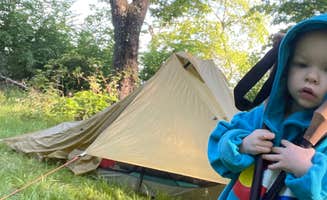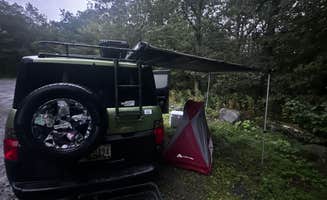Dispersed camping options near Lebanon, New Jersey typically require hikers to travel short distances from designated parking areas to reach authorized primitive sites. The elevation across this region ranges from 400 to 1,200 feet, with deciduous forest dominating the landscape. Most legal dispersed camping locations enforce strict regulations concerning fires, waste disposal, and overnight stays during the peak season from April through October.
What to do
Hike to overlooks: Bake Oven Knob offers a rocky, short trail to panoramic views of the Pennsylvania countryside. According to one camper, "The hike to the overlook is really lovely; short and rocky" when accessing this Bake Oven Knob primitive camping area.
Explore marsh ecosystems: The Thunder Swamp Trail system provides access to wetland habitats with diverse wildlife viewing opportunities. One visitor notes they "went down Saw Creek trail to a marsh" during their stay at the Thunder Swamp Trailhead.
Practice hammock camping: The sloped terrain at many sites makes hammocks preferable to tent setups. Appalachian Trail sites offer "good trees for hammocking" according to experienced backpackers who frequent these primitive locations.
What campers like
Secluded spots: The Appalachian Trail Designated Backpacker Campsite 2 provides both communal and private camping areas. One backpacker described the experience: "We camped nearer to others but there are secluded spots too."
Bear protection infrastructure: Several backcountry sites feature bear boxes for food storage. Campers appreciate that the areas are "well maintained w bear boxes provided" to prevent wildlife encounters.
Overnight parking options: For those seeking minimal hiking with vehicle access, some trailhead parking lots permit overnight stays. One regular visitor mentioned, "I've overnighted in my van here a bunch, no problems" at one of the two large lots at Bake Oven Knob.
What you should know
Water availability challenges: Most rustic camping sites near Lebanon lack reliable water sources. Campers should plan accordingly, as "nearest [water] is sunfish pond - easy hike about a 1 mile round trip" from certain campsites.
Permit requirements: Some dispersed camping areas across the Pennsylvania border require permits before overnight stays. Check with the Delaware Water Gap National Recreation Area office for current regulations.
Unmarked camping areas: Despite official designation, some approved camping spots lack clear signage. A visitor noted that "the site itself is unmarked when you come to it, but it's the only pretty obvious camping spot on the trail."
Tips for camping with families
Gravel lot accessibility: For families with young children, the Thunder Swamp Trailhead provides "plenty of shade" in a "gravel parking lot" where overnight parking is generally tolerated, minimizing hiking distances with gear.
Shelter proximity: When planning overnight hikes with children, consider sites near trail shelters. Some locations feature shelters approximately "0.5 mile in" from parking areas, providing emergency options during inclement weather.
Terrain considerations: Many primitive sites feature uneven ground not ideal for family-sized tents. A reviewer specifically mentioned that one site is "a little on the small and sloped side for tent camping," making advance planning essential.
Tips from RVers
Parking lot dimensions: The Appalachian Trail Campsite access points feature small gravel lots that accommodate smaller vehicles but present challenges for larger rigs. Standard parking areas typically fit 5-8 vehicles maximum.
No hookup options: All dispersed camping locations near Lebanon lack electrical, water, and sewer connections. Self-contained units must arrive with full water tanks and empty waste tanks.
Overnight etiquette: When using trailhead parking for overnight stays, maintain low impact by avoiding generator use, minimizing light pollution, and departing early. This helps preserve access for future visitors as these are not designated RV camping areas.



